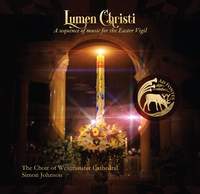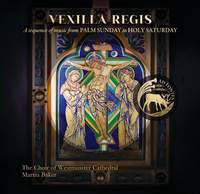Interview,
Simon Johnson on the Easter Vigil at Westminster Cathedral

Easter approaches once again, and with it performances of works drawn from the rich history of musical responses to one of the most significant parts of the Christian year. From dramatic Passion settings and outpourings of grief for Good Friday, through to the triumphant narrative of Easter Day itself, it's a story that continues to move and inspire people from all kinds of faith backgrounds.
One of the most special services of the period leading up to Easter is the Easter Vigil - held on the evening of the Saturday preceding Easter Day, it's an ancient liturgy with elements dating back to the very first centuries of Christianity, and at its heart follows a trajectory from darkness into light. Often this element is enacted literally, with a single candle being lit outside the church building and ceremonially carried into the darkened space at the beginning of the service.
Not surprisingly, the Easter Vigil is also a high point of liturgical musicmaking across the Christian denominations; a new recording from the choir of London's Westminster Cathedral on the Ad Fontes label showcases the musical celebration of the Easter Vigil within the Roman Catholic tradition. I spoke to the Cathedral's Master of Music Simon Johnson about the components that come together to make this service, as well as discussing his own career and the move away from the organ console towards focusing more on conducting.
This is your first recording with the choir since becoming Master of Music in 2021. How significant a change, musically and liturgically, was it to move from St Paul’s Cathedral to Westminster Cathedral?
The big change is all the plainsong that we do here. It's part of every single service, and usually quite a big part. I've done a bit of it in the past, of course, but nothing like the quantity we do here. I absolutely love it!
In terms of the liturgies - Mass is broadly similar to Church of England Eucharist in terms of the ‘Ordinary’ musical parts of the service. Likewise, Vespers has some similarities to Evensong. And I think the nature of the whole operation - having a choir school and a professional back row - is very similar.
There are so many Magnificat and Nunc Dimittis settings written for C of E use - presumably you can't use many of those?
Well, there is a Magnificat at Vespers - it's an important and central part of that service - but yes, we don't do things like Stanford in C or Dyson in F. It's a bit more Renaissance and, crucially, in Latin, and the music choices flow from the liturgy. So, for example, the choice of Magnificat is always related to the plainsong tone of the antiphon that goes before and after it. If the antiphon (which is in Latin) uses, say, the eighth tone, then you do a Magnificat (also in Latin) on the eighth tone and simply choose your composer. So in some ways it's quite proscriptive in terms of what you can choose.
So it's fairly Renaissance-focused in general?
Yes. Heavily leaning towards the polyphonic tradition, and with the plainsong always informing those wonderful, interweaving musical lines.
With your new position presumably geared mostly towards conducting, do you miss the amount of organ-playing you were able to do at St Paul’s?
Sometimes! But, generally, I always thought that I was destined to be in front of the choir, so I feel I've arrived in that sense.
Having been the Organist at St Paul's Cathedral for a good stint, I felt that I’d gone about as far as I could in that direction, and having done a lot of playing for twenty-five years, I'd learned a lot of the pieces that I really wanted to play, played most of the accompaniments, and also played for some really big services, as well as in concerts all over the world. It felt like the right time to move over, and Westminster was always a favourite choir. But I still enjoy the odd occasion when I’m let loose at the keys!
A few years ago there was quite a bit of excitement in church-music circles around the fact that St Paul's had appointed a conductor who was a singer and not an organist, which was extremely unusual. Is the same sort of thing true at the Cathedral?
Well, we have fewer staff here, so it's expected that the music team can all play the organ because we have a lot of services. At St Paul's they have more staff, and so they had a bit more leeway to think differently in terms of appointments. Andrew Carwood (the conductor you’re referring to) came from a singing background and had run other ensembles too - he had a different history and I think appointing him was a really great thing for St Paul’s to do, and something from which I benefitted enormously in developing my own approach to conducting. Not long after he'd taken the post, he appointed me to look after the organ side of things, and it was a lovely partnership of which to have been part.
This album seeks to recreate quite faithfully the Easter Vigil service itself - including traditional elements of plainsong such as the Exsultet. What drew you to this approach, rather than for instance a looser collection of favourite Easter anthems and motets?
There's two things - firstly this is the most liturgical choir I've ever encountered; everything we do is formed from that liturgical perspective. There is a natural narrative and momentum to the Easter Vigil, so it has a very nice sweep in its own right, and I think that translates really well onto an album.
Secondly, we're very much being encouraged by Ad Fontes, the label that are releasing the album, to pursue a liturgical – and specifically a Catholic liturgical – approach. They're based at Buckfast Abbey and, before my time, probably about five years ago now, the choir made a CD of music for Holy Week down there, and they were keen for us to complete the circle with an Easter one.
And I suppose with the interwoven-ness of the plainsong, you can't so easily pull bits out and offer a 'favourite anthems' selection?
Yes, that’s right - and the texts for the Easter Vigil itself are also quite proscriptive. You can't just decide to do something else. And actually I quite like that discipline.
I noticed that the Exsultet wasn't the translation I was used to - is that a difference between C of E and Catholic liturgy?
Yes, it is slightly different, but we also used a shorter version for the recording!
Westminster Cathedral has a magnificent track record of commissioning new music - from Britten, Vaughan Williams, Bingham, Stephen Hough and others. Do you have plans to commission further works in the future?
Post-Covid it's been very much a rebuilding exercise - with the choristers, we effectively had to start from scratch again, and the first two years have been re-learning all the plainsong (including how to read plainsong, things as basic as that) and the core repertoire – pieces such as the Palestrina Missa Brevis and so on. There’s a lot of material that’s very central to what happens here and it comes around a lot, so it’s been important to get the basic elements in place. That said, we had a big year last year of doing lots of Byrd, for the anniversary, and that was actually a really good thing to do because the choristers had to re-learn how to sight-read and learn things quickly. So yes, with the basics back in place and the boys reading again, we are now looking at commissioning once more. It's been such an important part of the tradition here that it's definitely something we want to carry on.
Joseph Phibbs was commissioned to write a piece for the St Cecilia service here, and I'm hoping we'll be working with him some more; I think he writes really well. And there are various other people we want to approach. So new music is all very much on the horizon again, which is great.
There’s a combination of old and new here - from plainsong, via Renaissance polyphony, to the Exodus Canticle by Andrew Reid (b. 1971) and your predecessor Martin Baker’s setting of O filii et filiae. Does that balance reflect the day-to-day offering of music at the Cathedral?
Yes, broadly. It really depends which day you turn up. On an average weekday we'll certainly be doing a lot of plainsong - that's the lifeblood of the whole operation here - and a lot of Renaissance polyphony. Palestrina, Byrd, Tallis, Victoria, Lassus, Guerrero, all those fabulous Renaissance composers. And then into that we throw a lot of new stuff. For example, MacMillan has written a fair amount for this choir, so we do that, and Bingham's Mass written for here is, I think, one of her best pieces and we do that during in Eastertide each year. It's a really fabulous piece. And pieces such as the Vaughan Williams Mass in G minor (which is 101 years old now!) is very much a core part of what we do. Building on that tradition is really important. If you're going to hear the Vaughan Williams, you're probably going to be coming on a Sunday - that sort of piece will always be a big Sunday piece.
What's the service makeup in terms of commitment during the week?
There's Mass and Vespers each day - the men will sing Vespers on the weekdays and the boys will then join them for Mass at 5.30pm. On Saturdays the boys go home and the men sing a Mass in the morning, and on Sundays we'll do a big Mass at twelve o'clock and four o'clock Vespers with the full choir.
Westminster Cathedral Choir, Simon Johnson
Available Formats: CD, MP3, FLAC, Hi-Res FLAC
The Choir of Westminster Cathedral, Peter Stevens (organ), Martin Baker
Available Formats: CD, MP3, FLAC, Hi-Res FLAC




